|
































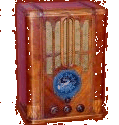
|
 |

|


"Colby Radio Frequency Broadcast Receiver"
Auburn, New York - circa 1925
The Colby Telegraph School and
The Colby Radio Research Laboratory, Auburn NY
Edward L. Colby (1879-1956), Auburn, New York
Information and photos relating to Edward L. Colby, his radio patents,
Colby Radios, and the Colby Radio Research Laboratory located in Auburn NY.
If you have any information about Edward L. Colby or Colby Radios, please contact me.

Edward L. Colby was a pioneer and founder of one of the first wireless schools. He was also an experimenter
and inventor of early tuning apparatus and a manufacturer of receiving equipment.
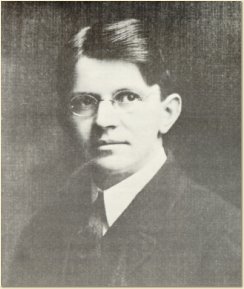
Edward L. Colby
|
Colby was born in Groton New York in 1879. As a boy he became interested in Rail Road Telegraphy.
Colby along with some friends, strung telegraph wires from the Lehigh Valley Rail Road Station in Richfield N.Y.
to a local store and hotel where he and others were able to learn Morse Code. Colby became a telegrapher with
the Lehigh Valley Rail Road and was stationed in Auora N.Y. In 1905 he was transferred to the Auburn station. Shortly after this
he left the railroad and founded the Colby Telegraph School in downtown Auburn.
Colby's students learned railroad code as well as operation of switchboards and other equipment. In 1910 Colby also began training "Wireless" operators.
In 1910 Colby started transmitting wireless signals from a 2KW spark transmitter operated on 500 meters. The
first call sign he used was "C0". He was then granted a "Technical and Training School" radio broadcast
license which changed the call sign to 8YA.
|
The earliest public record I have so far on Edward L. Colby is 1899.
The Auburn N.Y. Directory lists E L Colby as being a Test Operator for the Lehigh Valley Railroad.
The directory lists his residence as 7 E. Genesee St. in Auburn. The 1900 directory lists his residence as 4 James.
The 1904 Directory shows him still working for the railroad and that he had moved to 21 Washington.
In 1908, the first listing appears for "Colby's Telegraph School" located over 106 Genesee.
In 1910 the school was located at 45-48 Cady Building, 8-12 South Street. Notice that in 1910
the term "Wireless" now appears in the ad. The ad states that a "Wireless Engineer" could earn up to $2,000 a year. That was a very good income at the time.
By the 1926 Auburn Directory, the listing had changed to "Edward L. Colby Radio Equipment" located at 76 Genesee Street. In 1930 the address is listed as 13 South Street.
In 1932 the "Colby Radio Research Laboratory" is listed at 18 South Street.
|
 |
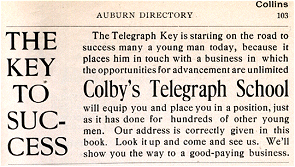
1908 ad for "Colby's Telegraph School"

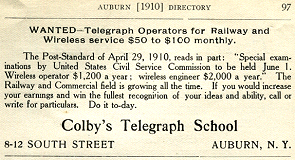
1910 ad using the term "Wireless"
|
The last listing I have for Edward Colby is in 1952 for "Colby Radio Service" at 18 South Street.

Edward Colby applied for and received at least two patents related to early "Wireless" communications.
 The first patent (#1058555) was granted on April 8, 1913.
It was for a "Receiving-Transformer" for wireless communications. The patent states that the apparatus is of "simple design" and "makes sharp tuning possible",
is capable of "preventing interference" and allows the listener to "cut-out unwanted stations".
The first patent (#1058555) was granted on April 8, 1913.
It was for a "Receiving-Transformer" for wireless communications. The patent states that the apparatus is of "simple design" and "makes sharp tuning possible",
is capable of "preventing interference" and allows the listener to "cut-out unwanted stations".
This "Receiving-transformer" used a combination of primary and secondary coil windings to allow fine tuning of stations.
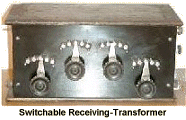 The second patent in 1914 (#1121479) further improved on the first, refining the tuning through the use of switchable primary and secondary tuning coils.
The second patent in 1914 (#1121479) further improved on the first, refining the tuning through the use of switchable primary and secondary tuning coils.
|
 |
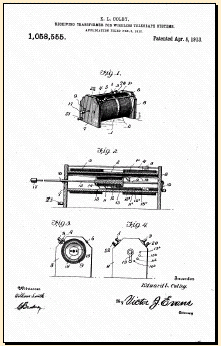
|
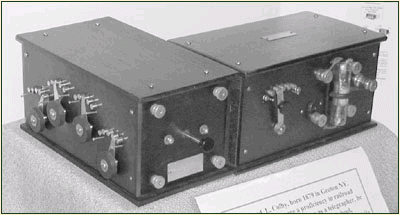
Colby Telegraph School Tuner and Detector

Colby produced several models of radios in Auburn. One of the radios I currently own is this
"Colby Radio Frequency Broadcast Receiver" shown at the right.
The lower right photo shows its patented "Receiving-transformer" assembly.
I have received photos of two other Colby radio models shown below (from an old auction web site).
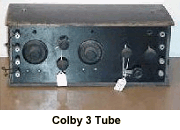
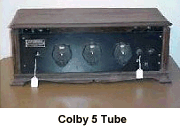
|



|

"Colby Radio Frequency Broadcast Receiver" circa 1925
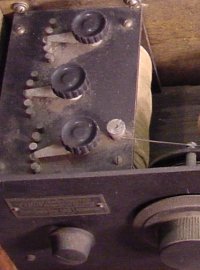
Patented Colby Receiving-transformer
|

Drawning of Colby Telegraph School Wireless antenna.
Downtown Auburn NY.
Circa 1922
|
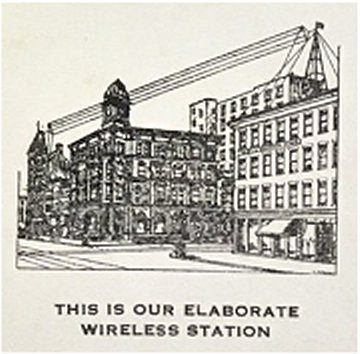 |


Cemetary records at Evergreen cemetery in Berkshire NY show Edward L. Colby, was born in 1879 and died in 1956.
|
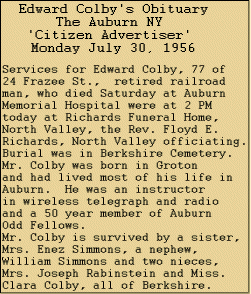 |

|
|
|









 The second patent in 1914 (
The second patent in 1914 (





